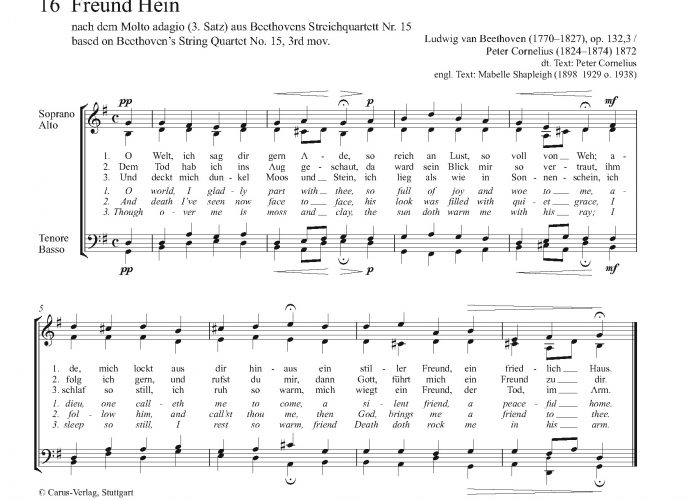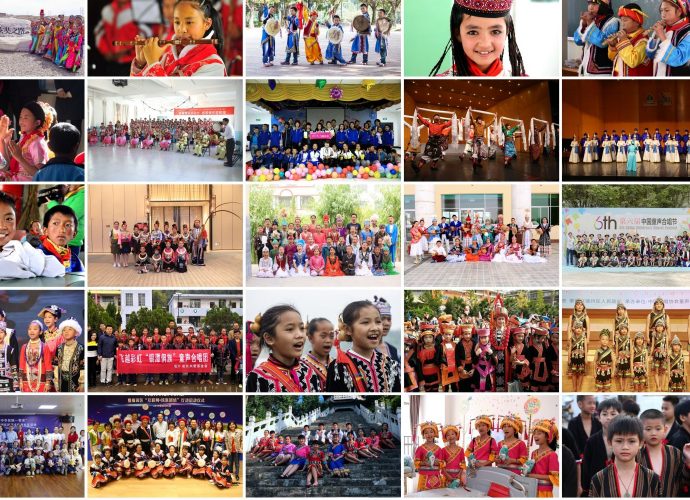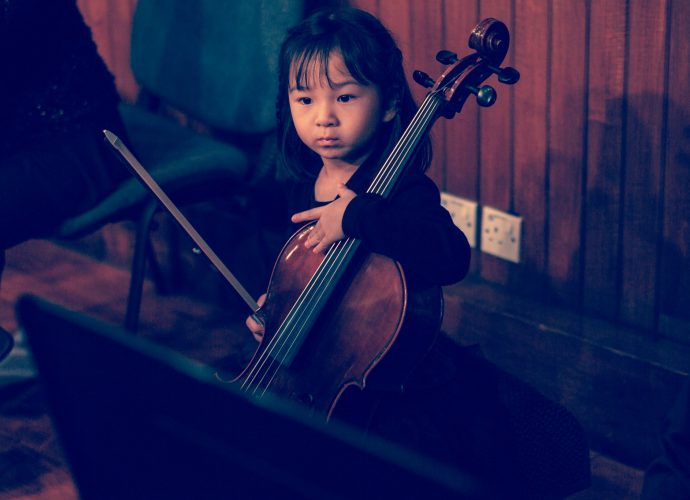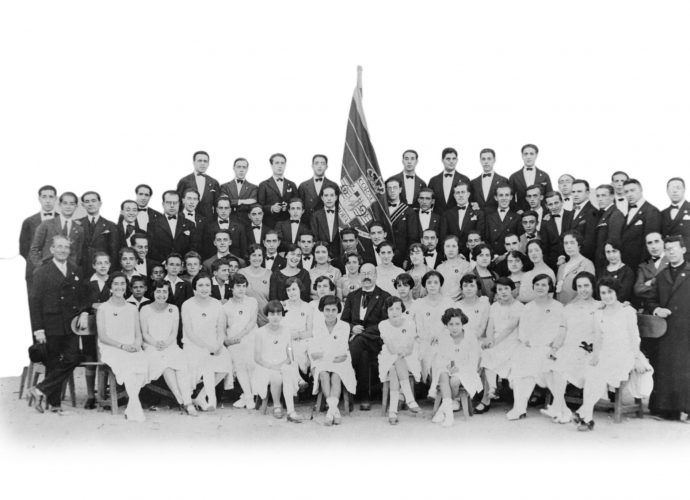Project: ENCORE (Page 22)
Quality-Tested New Music beyond Traditional Publication
by Deborah Simpkin King, Ed. Anna Willson, Director of Operation at ‘Project: ENCORE’
It seems like everyone today is performing new music. Composers’ competitions are springing up everywhere, and premiere performances and commissions are no longer as unusual as they once were. Though it is important to acknowledge the role that publishing houses have traditionally served, it is fair to say that nowadays, a great deal of compositional activity has nothing to do with a traditional publisher. Twenty-five years ago, most conductors would have turned almost exclusively to publisher catalogues and their reading sessions for repertoire. Most composers would have sought a publisher who would manage everything from printing and promotion to performance rights.
A recent survey reveals that 63% of professional composers reported being deeply involved with the promotion of their own work. In addition to the promotional ingenuity displayed by individual composers, a number of composer collectives have emerged, promoting a larger body of music through the joint efforts of a group of composers.
New Dilemma for conductors
Though these developments are exciting for champions of new choral music, they come with their own set of challenges. For composers, self-promotion represents a siphoning of creative energy away from the creative work of composition. For conductors, the evolution away from the traditional publishing house model has placed them on the receiving end of material from hundreds of composers eager for a performance - and there is never enough time. Additionally, many excellent composers are no longer even seeking traditional publications, so conductors cannot rely exclusively on publishers’ catalogues. Given the changing world of music publishing, promotion, and distribution, the need for a means of evaluating the large quantity of new music demands a unique response. That need has given birth to an initiative called Project: ENCORE™ (P:E).
P:E is a catalogue of contemporary choral music that provides twenty-first-century conductors with a lens for repertoire discovery and evaluation. Its platform is a unique website containing a free catalogue of contemporary choral music that has been reviewed and endorsed by a panel of renowned conductors. Each catalogue entry contains a full sound file, a complete score, composer biography and contact information, and full description, including text (and translations, where applicable).
The rich body of new choral music found in the P:E Catalogue encompasses varied styles, voicings and instrumentations, lengths, and levels of complexity. The search function is robust, even including such elements as keywords, seasons of the calendar and liturgical year, and poet/author. The compositions are a mix of works traditionally published, self-published, and coop-represented. As of February 2020, the catalogue contains 306 compositions and features 156 composers. P:E is not a publisher or a co-op, but an external resource that can work in collaboration with both. The function of P:E is to facilitate the connection; having done so, it has no further role and receives no fees from any parties.
Although P:E currently contains the work of more American composers than any other single nationality, the recent addition of a translator function to the online catalogue reflects the already noteworthy and growing number of international submissions. Reviewers reflect an international mix as well.
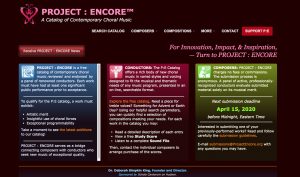
The Story Behind the Product
As with many things that ultimately take on significant proportion, P:E had its genesis in the experience of one composer and one conductor and her ensemble. In 2005, New Jersey based ensemble, Schola Cantorum on Hudson, performed the American premier of Mass by Randall Svane. Following this performance, premiering conductor Deborah Simpkin King collaborated with the composer in seeking additional performances for this admittedly challenging composition. Letters were sent to a strategically selected list of choirmasters around the world, along with the full score and sound file of the premiere performance. It wasn’t until two years later that the Kapellmeister at the Salzburg Cathedral expressed interest, inviting the European premiere in Sunday morning mass during the weeks of the famed Salzburg Festival - but only if the premiering choir would come to perform it. The tour was arranged and carried out in 2008, providing the catalyst for what would become P:E.
The experience highlighted a serious challenge long recognized in the community of composers: As challenging as it can be to secure a first performance for a new work, it is much more difficult to find groups and conductors willing to take on a second or third performance.
After the Premiere
Composers know all too well the difficulty of securing a second performance.
“Sometimes word of mouth will carry good news of a good performance,” says composer Hilary Tann, “But quite often I have felt, especially with smaller ensembles that the publicity machine doesn’t works so well… Clearly, the works are programmed because they’re commissioned. It’s the later performances that are the problem.” Lacking a second preparation and hearing, it is possible for a masterwork to sit neglected on a shelf indefinitely. It is as scenario played out in the studios of even well-known composers. “I have a couple of good pieces that are sitting, waiting for their second and third performances,” adds Tann.
Motivated to make a difference, Schola’s artistic leadership decided to highlight the issue with a concert season (2009-10) featuring post-premiere compositions. Not long after the decision was approved, a large stumbling block was encountered: There were no resources through which to locate such works. Short of scanning headlines of major news publications throughout the world for reviews of newly premiered works, it was unclear how such compositions were to be found. Unwilling to be diverted, it seemed obvious that the results should somehow be made available in ways that would benefit more than just those composers and audience members associated with Schola Cantorum on Hudson.
A New Paradigm
Solving the second-performance conundrum became the catalyst to create a new model of musical interdependence between composers, conductors, and ensembles. A steering committee was formed to help establish parameters addressing quantity manageability and quality insurance. Although financial sustainability was a concern for the small non-profit parent organization, it was decided that the resource would always remain free for composers and conductors. Determined to create a resource of lasting value, legal counsel was consulted regarding all elements of score rights, submission and access, and reviewer confidentiality. Ultimately an artist was commissioned to create the unique P:E logo, and a United States trademark was sought and awarded.
The P:E online catalogue of choral works (ProjectEncore.org) officially launched in June of 2009 and called for its first round of score submissions the following month. Today it is a continually expanding online catalogue of premiered and expertly evaluated compositions.
The Process
A composer may submit up to four scores per year. Composers submit an anonymous score for review in accordance with P:E’s double-blind process. Once submitted, each score is sent to three of the reviewers from the P:E review pool. This is a high-level, multinational team of reviewers, each of whom has a significant programming commitment to new music and is a highly noted conductor. These are necessarily unsung heroes, remaining anonymous for the same reason that the founder of P:E is not a reviewer: complete avoidance of not only a possible conflict of interest but even the appearance of conflict of interest. Reviewers give their time quarterly for no reason beyond their contribution to the choral art. The perspective from which P:E reviewers are asked to evaluate each composition is one of expansiveness beyond their own performance needs and style preferences. Each composition reviewed must be evaluated for its musical quality, its exploration of the choral idiom, and programmability; be it for church choirs, independent amateur groups, school choirs, or professional choruses. At least two “thumbs up” are necessary for acceptance. The entire process is by quarter annum, including public announcements of the new endorsements in The Choral Journal, Choralnet.org, and P:E social media.
Conclusion
The mushrooming popularity of new music performance represents an exciting opportunity for conductors and composers; it is a return to a historical norm. Interest in the newest scores was a tradition the musical world has lost touch with for about a century, and today all options are at our fingertips! New music is available in abundance for review and study through efforts like that of this project. Whether searching to fill a specific programming need or seeking to discover a fresh compositional voice, P:E is a resource to explore!
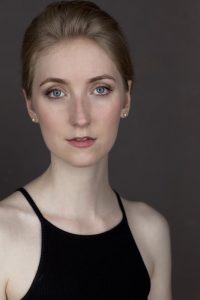 Anna Willson is a New York City based vocalist and pianist, and is the Director of Operations for PROJECT: ENCORE™. She holds a degree in music from Whitworth University, as well as a Master of Vocal Performance degree from The Boston Conservatory. In addition to her role as Director of Operations, Anna has also sung several concerts with Schola Cantorum on Hudson’s vocal ensemble, Ember. Anna is a choral freelancer in New York City and also holds a permanent position in the Marble Collegiate Choir. Other choral engagements include her work as a singer and co-director of the New York Estonian Chorus. In addition to choral singing, Anna is also a part of NYC-based early music collective, Anglica Antiqua, and a performer in the contemporary avant-garde musicians collective, ÆON Ensemble. Recent premiers include the North American premiere of In the Name of the Earth by John Luther Adams as part of Lincoln Centre’s Mostly Mozart Festival; conducted in part by Schola’s Artistic Director, Deborah Simpkin King. Upcoming performances include a monthly contemporary music concert series with ÆON Ensemble as part of an artistic residency at St. John’s in the Village, NYC. Email: annawillson@scholaonhudson.org
Anna Willson is a New York City based vocalist and pianist, and is the Director of Operations for PROJECT: ENCORE™. She holds a degree in music from Whitworth University, as well as a Master of Vocal Performance degree from The Boston Conservatory. In addition to her role as Director of Operations, Anna has also sung several concerts with Schola Cantorum on Hudson’s vocal ensemble, Ember. Anna is a choral freelancer in New York City and also holds a permanent position in the Marble Collegiate Choir. Other choral engagements include her work as a singer and co-director of the New York Estonian Chorus. In addition to choral singing, Anna is also a part of NYC-based early music collective, Anglica Antiqua, and a performer in the contemporary avant-garde musicians collective, ÆON Ensemble. Recent premiers include the North American premiere of In the Name of the Earth by John Luther Adams as part of Lincoln Centre’s Mostly Mozart Festival; conducted in part by Schola’s Artistic Director, Deborah Simpkin King. Upcoming performances include a monthly contemporary music concert series with ÆON Ensemble as part of an artistic residency at St. John’s in the Village, NYC. Email: annawillson@scholaonhudson.org
Edited by Mirella Biagi, UK/Italy


